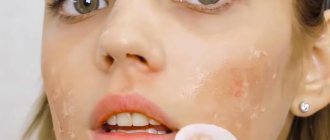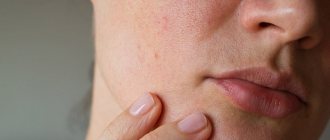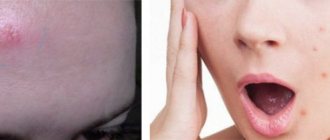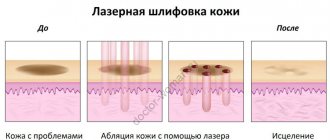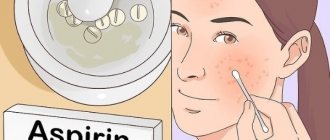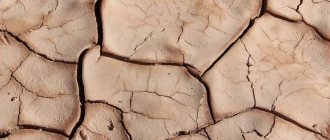the problem of comedones on the skin of the face and body, and not only during teenage hormonal changes. Those with oily skin have to cope with this problem all their lives using any available means. In our article we will tell you what comedones are, why they appear and how to get rid of them.
What are comedones and what are they like?
Epidermal cells are constantly renewed throughout a person's life. And during the normal course of this process, the keratinized cells are exfoliated on their own, and the sebaceous ducts perform the function of secreting sebum ( sebum ). Sebum forms a hydrolipidic protective film on the surface of the skin.
However, in some cases, dead cells are not removed on their own, but form a stratum corneum that clogs the sebaceous ducts. Sebum can also become thicker for a variety of reasons, including being full of toxins. Due to the subcutaneous plug, a capsule is formed in the sebaceous gland, which creates an ideal environment for the development of bacteria. All this leads to inflammation, which is called comedones.
Let's look at the main types of comedones
Open comedones are the so-called blackheads. They are pores clogged with oxidized sebum and keratinized cells with melanin particles. Because of this, they have a dark shade and dense structure.
Closed comedones are small white subcutaneous nodules. They are formed when the sebaceous ducts are blocked by dead skin cells and sebum. Unlike blackheads, in closed comedones the plug is formed subcutaneously, and the duct does not have an exit to the outside. Papules quite often become inflamed, also cause pain, and a reddish tint appears around them.
Both types of comedones spoil the appearance, form irregularities, pigment spots, and depressions (as a consequence), and improper treatment and removal can cause the appearance of new lesions.
Many comedones form acne - a disease of skin rashes.
It is important not to confuse closed comedones with milia (epidermal cystic formations), sebaceous adenomas (benign skin formations characteristic of adulthood) and allergic rashes. Getting rid of these types of skin diseases is possible only in a beauty salon, under the supervision of a doctor.
Pathogenesis
Comedones occur as a result of excess sebum synthesis and disruption of the keratinization process - the formation and exfoliation of cells in the stratum corneum of the skin. As a result, characteristic plugs are formed at the mouth of the hair follicles, which fill them. Thus, sebum loses the opportunity to leave the follicle and begins to accumulate in it, forming cysts.
The removal of toxins through the pores of the skin is also impaired. They interact with sebum, forming a thick, glue-like mass. A mixture of toxins, sebum, partially released from the narrowed mouth of the follicle, as well as skin bacteria and dust, becomes dark under the influence of oxygen. This is manifested by the formation of black dots on the skin. When the orifice is completely blocked, the follicle greatly increases in volume, which leads to the formation of a white nodule.
Open comedones on the back and acne on the face. Photo: Chinese Medical Journal / Open-i (CC BY-NC-SA 3.0) and Roshu Bangal / Wikipedia (CC BY-SA 4.0)
What causes comedones?
In fact, there are many reasons for the formation of comedones, and to combat them you need an integrated approach. Therefore, it is necessary to exclude all possible provoking factors , change your lifestyle, and aim for constant support of your health. It is certainly possible to improve the situation, but you need to understand that the external manifestation of a problem always has internal causes that should be studied and eliminated, and this is a slow and systemic process.
So, let's name the main reasons for the appearance of comedones:
- hormonal imbalance (age-related changes, pregnancy or disruption of the glands);
- genetic predisposition;
- poor nutrition;
- lack of hygiene;
- poor environmental conditions;
- prolonged stress;
- lack of sleep;
- incorrectly selected cosmetics (which leads to allergies or clogged pores);
- bad habits;
- poor nutrition and poor drinking habits (which leads to indigestion).
Alternative therapy
In the fight against comedones, especially against the background of acne, the following natural remedies can be an effective addition to the main treatment³:
Tea tree oil. Gels containing at least 5% tea tree oil can be as effective as benzoyl peroxide lotions. Possible side effects include mild itching, burning, redness and dry skin.
Brewer's yeast. When taken internally, a strain of brewer's yeast called Hansen CBS may help reduce acne. A common side effect is increased gas production in the intestines (flatulence).
Stages of the appearance of comedones
- Sebum accumulates in the hair follicle and gets stuck in the duct due to, among other things, a dense keratinized layer of cells (hyperkeratosis).
- The release of toxins from the deep layers of the dermis becomes more difficult.
- Sebum thickens and becomes filled with toxins and bacteria.
- The duct expands under the pressure of harmful substances accumulated in it.
- Further stages of development differ depending on whether an open or closed comedon appears:
- Or a dark plug when sebum oxidizes and melatonin (pigment) appears.
- Or the papule remains under the skin, causes internal inflammation and eventually breaks out (closed comedon).
Diagnostics
For an experienced dermatologist, an external examination of the patient’s skin is enough to immediately make the correct diagnosis. Specialized laboratory research methods allow us to clarify the mechanism of development of the disease and the presence of pathologies of internal organs: blood tests for hormonal balance and internal infections, tomography of the gastrointestinal tract and liver. It is possible to prescribe additional measures as part of a standard examination if the patient has a history of serious diseases of the internal organs.
How to get rid of closed comedones on the face
To completely get rid of comedones, it is necessary to take comprehensive measures: consult a dermatologist or cosmetologist, and also follow all instructions at home.
So, at home you need :
- make therapeutic masks containing blue clay, as well as light peelings and scrubs for home use;
- include antioxidants : fresh fruits and berries, spinach, lettuce leaves, green tea - this will help remove toxins from the body;
- use cosmetics containing keratolytics .
Keratoloitics are necessary to thin the stratum corneum of the skin, which increases the risk of comedones. Among them:
- salicylic acid 2-4% (cosmetics with a high percentage of acid are suitable for the skin of the back, neck, etc.);
- fruit acids AHA (or hydroxy acids), because they oxidize the pH of sebum, which prevents the proliferation of bacteria;
- retinol (including in peelings) - as a rule, is prescribed for external use for a long period, up to six months, with a gradual increase in the amount of the drug and the frequency of application. Suitable for the treatment of acne and multiple comedones. Oral systemic retinoids are prescribed by a doctor if necessary.
The use of keratolytics has a complex effect on the epidermis: cleansing, softening, antiseptic, brightening, stimulating the removal of the stratum corneum, opening comedones and cell renewal.
However, their use also thins the skin, making it more sensitive and unprotected, including from the sun. The cosmetologist chooses the appropriate remedy for each clinical situation and the duration of its use. He will also suggest the optimal sunscreen and tell you about other methods of skin protection.
Let's consider the options for solutions and treatment procedures that modern professional cosmetology can offer.
Why retinol?
Retinoids are a group of drugs based on vitamin A, represented by retinol and its derivatives.
The Global Alliance of Dermatologists and Cosmetologists, based on many years of research, clinical observations and treatment of patients with problem skin, has come to the conclusion that
Retinoids are the N1 substance in acne therapy.
Russian experts classify retinoids as first-line drugs for the treatment of problem skin with acne.
The term “1st line” means that they are recognized as the most effective and it is worth starting therapy with their prescription.
One of the main goals of acne treatment is not just to stop the process and get rid of acne, it is important to prevent the appearance of scarring. After all, getting rid of scars is almost impossible!
For a detailed understanding of the reasons for which the Global Alliance of Dermatologists and Cosmetologists made this conclusion, let’s begin the analysis by listing the points where retinol works for acne.
Treatment procedure using the M22 device
The treatment principle is based on the targeted action of light rays in the range of 311 nm. The phototherapy procedure is absolutely painless and safe, and at the same time very effective. There is no long recovery period required after it. Additional advantages are that one session only takes about 30 minutes, and the effect is targeted only to problem areas.
In addition to the treatment of comedones and acne, there is also photorejuvenation, pigmentation treatment, lifting, and also has an antiseptic effect. The necessary parameters are set on the device: wavelength and depth of exposure, radiation intensity, intervals between flashes and their duration. Before the procedure, the cosmetologist cleanses the skin, applies a conductive gel and protects the eyes of himself and the patient with special glasses.
The M22 hardware procedure is recommended not only for the treatment, but also for the prevention of acne.
Other manifestations of comedonal acne
Large closed comedones (over 3 mm), which are localized in the cheek area and above the joints, are called microcysts or macrocomedones. They not only cause aesthetic inconvenience, but under certain conditions they can transform into more severe forms of acne.32
Small multiple closed comedones can be localized in groups. When you touch the skin with your hand, you can clearly feel the roughness. Typically, external treatment of this type of acne is supplemented with systemic medications.32
Chemical peeling
As mentioned above, light peelings can be carried out at home, however, more intense and, of course, effective chemical peels can only be carried out within the walls of a cosmetology clinic under the strict supervision of a cosmetologist to avoid skin burns. Chemical peeling exfoliates dead skin cells, tightens pores, and has an antiseptic and brightening effect.
Let's look at the most popular types of chemical peels.
Milk peeling is suitable for very sensitive skin. It can be done at any time of the year. Lactic acid is found in pickles and lactic acid fermentation products. In addition to it, the composition includes urea and a complex of amino acids. This peeling gently exfoliates and at the same time moisturizes the skin, and also stimulates the growth of new cells,
Almond can be on a gel or water-alcohol basis, and can also contain not only the main component (mandelic acid), but also other types of acids. Used to improve skin quality, regulate sebum production, reduce the appearance of wrinkles and age spots.
Azelaine peeling normalizes keratinization in the follicle ducts and sebum production, has an exfoliating, antibacterial and anti-inflammatory effect. It contains nonandioic, 1.7-heptanedicarboxylic acid, which is found in wheat, barley, lilac and other plants.
Glycolic and salicylic peels (AHA and BHA) are often performed simultaneously. In tandem, they have the maximum therapeutic effect: they not only cause the death of old cells, cause their desquamation, but also stimulate the production of natural collagen, as well as skin regeneration. They also discolor pigment spots and post-acne, improve metabolic processes.
How to avoid comedones
- maintain hygiene , including regularly changing face towels and bed linen;
- avoid touching your face with your hands;
- normalize nutrition (avoid sweet, fatty, floury, fried foods and fast food), maintain a drinking regime, take vitamins;
- maintain a sleep schedule and try to avoid overwork and stress;
- do not neglect physical activity - this helps speed up metabolic processes, saturate cells with oxygen and remove toxins;
- to refuse from bad habits;
- use medications and medicinal products prescribed by a cosmetologist;
- monitor hormonal levels and avoid any changes;
- avoid prolonged exposure to the open sun;
- Do not self-medicate and do not use unproven methods of traditional medicine.
Prices for mechanical facial cleansing
| MECHANICAL FACIAL CLEANING, category 1 | 7 900₽ |
| Service code | Service name | Number of services | Price |
| A16.01.024.09 | Dermatological peeling Code: A16.01.024.09 | 1 | 3 000 ₽ |
| A14.01.007 | Applying a hot compress to the skin of the face Code: A14.01.007 | 1 | 350 ₽ |
| A20.01.001.02 | Applying cream (mask) according to skin type Code: A20.01.001.02 | 1 | 250 ₽ |
| A20.01.001.01 | Applying a mask according to skin type Code: A20.01.001.01 | 1 | 1 800 ₽ |
| A14.01.005 | Cleansing the skin of the face and neck Code: A14.01.005 | 1 | 300 ₽ |
| А14.01.009.03 | Removal of facial skin comedones, category 1 Code: A14.01.009.03 | 1 | 2 200 ₽ |
| SERVICE PACKAGE A14.01.009.01 | Promotion! Price for a package of services under the promotion ( Discount: 56% ): | 3 500₽ |
| MECHANICAL FACIAL CLEANING, category 2 | 9 200₽ |
| Service code | Service name | Number of services | Price |
| A16.01.024.09 | Dermatological peeling Code: A16.01.024.09 | 1 | 3 000 ₽ |
| A14.01.007 | Applying a hot compress to the skin of the face Code: A14.01.007 | 1 | 350 ₽ |
| A20.01.001.02 | Applying cream (mask) according to skin type Code: A20.01.001.02 | 1 | 250 ₽ |
| A20.01.001.01 | Applying a mask according to skin type Code: A20.01.001.01 | 1 | 1 800 ₽ |
| A14.01.005 | Cleansing the skin of the face and neck Code: A14.01.005 | 1 | 300 ₽ |
| А14.01.009.03 | Removal of facial skin comedones, category 2 Code: A14.01.009.03 | 1 | 3 500 ₽ |
| SERVICE PACKAGE A14.01.009.02 | Promotion! Price for a package of services under the promotion ( Discount: 46% ): | 5 000₽ |
| MECHANICAL FACIAL CLEANING, category 3 | 9 700₽ |
| Service code | Service name | Number of services | Price |
| A16.01.024.09 | Dermatological peeling Code: A16.01.024.09 | 1 | 3 000 ₽ |
| A14.01.007 | Applying a hot compress to the skin of the face Code: A14.01.007 | 1 | 350 ₽ |
| A20.01.001.02 | Applying cream (mask) according to skin type Code: A20.01.001.02 | 1 | 250 ₽ |
| A20.01.001.01 | Applying a mask according to skin type Code: A20.01.001.01 | 1 | 1 800 ₽ |
| A14.01.005 | Cleansing the skin of the face and neck Code: A14.01.005 | 1 | 300 ₽ |
| А14.01.009.03 | Removal of facial skin comedones, category 3 Code: A14.01.009.03 | 1 | 4 000 ₽ |
| SERVICE PACKAGE A14.01.009.03 | Promotion! Price for a package of services under the promotion ( Discount: 38% ): | 6 000₽ |
How to properly care for skin with open and closed comedones
If the skin is prone to oiliness and the formation of closed and open comedones, it requires special care. Necessary:
- wash your face and use alcohol-free tonics and lotions containing acids;
- minimize the use of foundation and other cosmetic products that clog pores;
- do self-massage and tone the skin with contrasting washes and showers;
- use sunscreen cosmetics;
- monitor cell renewal, use home peelings and special brushes for washing, do not bring the skin to a critical condition;
- moisturize and nourish the skin from the outside to avoid drying and peeling. Restoring the water balance of the epidermis is extremely important for successful treatment;
- squeeze out pimples yourself
- regularly , undergo all prescribed procedures and follow recommendations.
Causes of acne
All causes of acne development can be divided into exogenous and endogenous.
Exogenous ones include41,50,29:
- Skin injury. Wearing uncomfortable, tight, chafing clothing can cause skin irritation and acne. Squeezing pimples also promotes inflammation, infection, and triggers the proliferation of pimples.
- Wrong choice of cosmetics. The content of comedogenic components in cosmetics can cause a rash. Constantly drying out the skin with lotions containing alcohol can cause the skin to produce more sebum for hydration.
- Taking medications. Systemic glucocorticosteroids, anabolic steroids, and cytostatics can provoke acne.
- Poor nutrition. Dairy, sweet products, coffee, fatty foods, as well as those rich in iodine, bromine, glucose, sucrose - the presence of all this in the diet will have to be reconsidered, since these are the main food provocateurs of acne.
Endogenous factors are identified through additional diagnostics and testing41,50,29:
- Endocrine pathologies. These include thyroid diseases, PCOS, pituitary adenoma, etc.
- Vegetovascular dystonia. If the autonomic innervation of precapillaries, microvasculature, arterioles, and capillaries is disrupted, then this pathology can also be considered as an acne trigger.
- Chronic diseases of the gastrointestinal tract. Chronic gastritis, ulcers caused by H. pylori, gastroduodenitis can lead to the appearance of acne on the skin.
Acne can also be caused by stress, genetic factors, immunodeficiency and other conditions41, 29.
